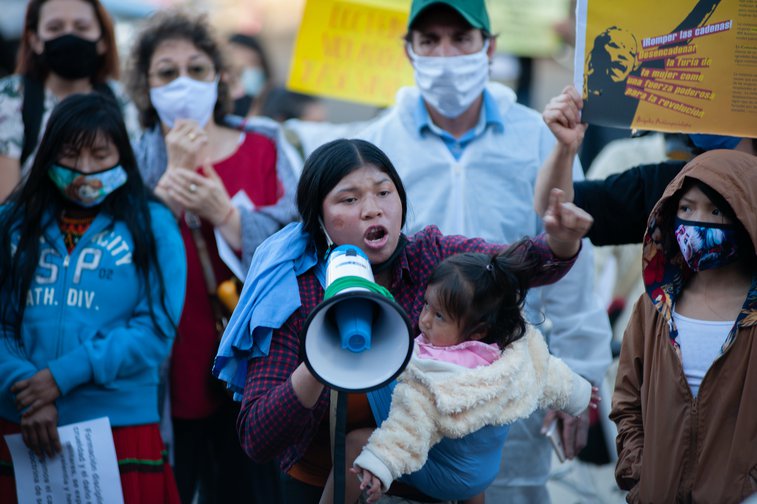A Brief Colonial History Of Ceylon(SriLanka)
Sri Lanka: One Island Two Nations
A Brief Colonial History Of Ceylon(SriLanka)
Sri Lanka: One Island Two Nations
(Full Story)
Search This Blog
Back to 500BC.
==========================
Thiranjala Weerasinghe sj.- One Island Two Nations
?????????????????????????????????????????????????Monday, December 14, 2020
Three ways to defend human rights defenders
On human rights defenders’ day, we propose three main takeaways from 2020 that can guide our important work advocating for those who defend our rights and environment in the new year.
 |
In early March 2020, just before the novel coronavirus exploded across global headlines, U.N. Special Rapporteur on the situation of human rights defenders Michael Forst presented a report before the Human Rights Council on a deadly pandemic in Colombia: human rights defenders, especially those defending their territory and the environment, were dying at alarmingly high levels due to unchecked rates of violence, threats and rampant impunity.
Months later, with lockdowns underway and death tolls rising, a report by Global Witness scored Colombia as a global ground-zero for environmental defenders. The same document also found that of deadliest countries for defending environmental rights across the world, five were in Latin America. According to the report, “over two thirds of the murders of HRDs took place in Latin America” with killings in Honduras increasing from four in 2018 to 14 in 2019, making it the country with the highest percentage increase. The Amazon meanwhile saw 33 deaths, 90% of those in Brazil.
Sadly, the data shows that when it remains unchecked, violence against defenders is viral. Furthermore, if we fail to find an appropriate treatment, we will only continue to lose the best line of defense against the destruction of our forests, jungles, rivers; and the preservation of equality and democracy.
On human rights defenders’ day, here's three main takeaways from 2020 that can guide our important work advocating for those who defend our rights and environment in the new year:
First, any of us can be a human rights defender from the moment we protest peacefully on the streets, litigate cases in a courtroom, or denounce crimes online. Recognizing the value of HRDs supports our own ability to dissent and dream. Violence and threats should not be naturalized as the necessary toll for defending rights.
According to a global survey of 196 human rights defenders conducted by the Center for Justice and International Law finalized in early 2020, 85% of participants had, or knew first hand of someone who had received some form of threat because of their work.
Colombia is an example of what happens when impunity fuels cycles of violence against defenders.
In Latin America and the Caribbean, where most responses were received, approximately 95% of HRDs responded that they believed that they would not face threats if they did not engage in their current activism—as opposed to 60% from other regions.
The immediate impact of threats is that they interrupt an HRDs work of helping communities at risk advocate for water, food, safety and other rights and resources during shutdowns and the COVID-19 recovery process, for example; or making sure peaceful protests against racial discrimination and police brutality receive necessary logistical and legal support, especially in the face of increasing regional militarization and hard-line tactics brought on by the pandemic; and triaging medical supplies in an indigenous community in the tri-border region in the Amazon, despite threats from armed groups.
Second, States must follow through with the investigation, prosecution, and punishment for those responsible for crimes against HRDs. Colombia is an example of what happens when impunity fuels cycles of violence against defenders.
One need only look at the recent case of espionage against human rights defenders, lawyers, and journalists uncovered by the Bogota-based Semana magazine at the end of 2019. While the technologies used to intercept mobile phones and emails were new and likely bankrolled by the United States, historically there is a long line of abuse and control by the Colombian government and military authorities against those perceived to be in opposition to their political agendas dating back to the 50s and more famously under president Alvaro Uribe Vélez.
How do we inspire the next generation of defenders to sustain or improve social progress, without expecting that they too will pay an emotional or physical toll?
At a recent hearing, the Inter-American Commission on Human Rights pointed to this persistent abuse, indicating that an absence of a thorough investigation to identify a motive and an operating structure had only led to the repetition of this phenomenon.
Third, the work of human rights defenders should be celebrated. This not only implies shifting the cultural attitudes which surround us but examining how we as human rights defenders, organizations and stakeholders continue to support one another to respond to our calling of defending our communities and our planet in the coming years.
All too often, HRDs in conversation with one another brush off threats and other acts of violence; or consider that them as an expected result of a job well done in adverse contexts. But in order to make this world a fairer, more just, democratic place, free from structural discrimination and environmentally sustainable, we need of millions more engaged in this important work. How do we inspire the next generation of defenders to sustain or improve social progress, without expecting that they too will pay an emotional or physical toll?
When Human Rights Defenders are affected by threats, death and impunity, our societies, economies and democracies are interrupted. Universal standards that address the right to defend rights, that counter the pervasive threats and impunity, must be a regional priority in 2021 and walk hand-in-hand with a cultural conversation about the value of the right to defend rights. Our invitation this Human Rights Month is to deepen the conversation and find paths to ensure that we can take steps forward in achieving our shared goals of a more democratic, sustainable, fair, equitable continent.

